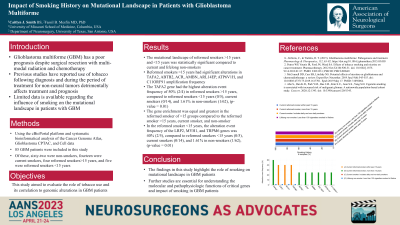Impact of Smoking History on Mutational Landscape in Patients with Glioblastoma Multiforme
Friday, April 21, 2023

Has Audio

Caitlyn Smith, BS
Medical Student
University of Missouri School of Medicine
Columbia, Missouri, United States
ePoster Presenter(s)
Introduction: Glioblastoma multiforme (GBM) has a poor prognosis despite surgical resection with multi-modal radiation and chemotherapy. Previous studies have reported use of tobacco following diagnosis and during the period of treatment for non-neural tumors detrimentally affects treatment and prognosis. Limited data is available regarding the influence of smoking on the mutational landscape in patients with GBM. This study aimed to evaluate the role of tobacco use and its correlation to genomic alterations in GBM patients.
Methods: Using the cBioPortal platform and systematic bioinformatical analysis of the Cancer Genome Atlas, Glioblastoma CPTAC, and Cell data, 85 GBM patients were included in this study. Of these, sixty-two were non-smokers, fourteen were current smokers, four reformed smokers>15 years, and five were reformed smokers < 15 years.
Results: The mutational landscape of reformed smokers >15 years and < 15 years was statistically significant compared to current and lifelong non-smokers. Reformed smokers >15 years had significant alterations in TAFA2, ABTB2, ACR, AMBN, ARL14EP, ATP6V1H, and C11ORF91 amplification frequency. The TAFA2 gene had the highest alteration event frequency of 50% (2/4) in reformed smokers >15 years, compared to reformed smokers < 15 years (0/5), current smokers (0/14), and 1.61% in non-smokers (1/62), (p-value = 0.01). The gene enrichment was equal and greatest in the reformed smoker of < 15 groups compared to the reformed smoker >15 years, current smoker, and non-smoker. In the reformed smoker < 15 years, the alteration event frequency of the LRP2, MYH1, and TRPM6 genes was 40% (2/5), compared to reformed smokers < 15 years (0/5), current smokers (0/14), and 1.61% in non-smokers (1/62), (p-value = 0.01).
Conclusion : The findings in this study highlight the role of smoking on mutational landscape in GBM patients. Further studies are essential for understanding the molecular and pathophysiologic functions of critical genes and impact of smoking in GBM patients.
Methods: Using the cBioPortal platform and systematic bioinformatical analysis of the Cancer Genome Atlas, Glioblastoma CPTAC, and Cell data, 85 GBM patients were included in this study. Of these, sixty-two were non-smokers, fourteen were current smokers, four reformed smokers>15 years, and five were reformed smokers < 15 years.
Results: The mutational landscape of reformed smokers >15 years and < 15 years was statistically significant compared to current and lifelong non-smokers. Reformed smokers >15 years had significant alterations in TAFA2, ABTB2, ACR, AMBN, ARL14EP, ATP6V1H, and C11ORF91 amplification frequency. The TAFA2 gene had the highest alteration event frequency of 50% (2/4) in reformed smokers >15 years, compared to reformed smokers < 15 years (0/5), current smokers (0/14), and 1.61% in non-smokers (1/62), (p-value = 0.01). The gene enrichment was equal and greatest in the reformed smoker of < 15 groups compared to the reformed smoker >15 years, current smoker, and non-smoker. In the reformed smoker < 15 years, the alteration event frequency of the LRP2, MYH1, and TRPM6 genes was 40% (2/5), compared to reformed smokers < 15 years (0/5), current smokers (0/14), and 1.61% in non-smokers (1/62), (p-value = 0.01).
Conclusion : The findings in this study highlight the role of smoking on mutational landscape in GBM patients. Further studies are essential for understanding the molecular and pathophysiologic functions of critical genes and impact of smoking in GBM patients.
